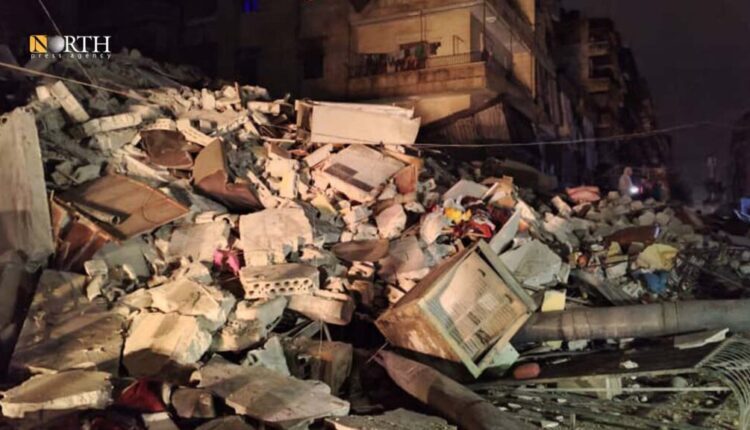
QAMISHLI, Syria (North Press) – Official at the International Federation of the Red Cross (IFRC) estimated on Saturday that recovery operations in Turkey will take two to three years, while in Syria, they will take from five to ten years just to get recovery underway.
CNN said, in a report, citing Caroline Holt, director of disasters, climate and crisesat the IFRC, “We have the perfect humanitarian storm in Syria.”
On Feb. 6, a 7.8-magnitude earthquake hit southern Turkey and northwest Syria, leading to large-scale destruction and thousands of deaths.
The deadly earthquake death toll in Syria surpassed 3.581 by Saturday night.
However, more than 5.348 injuries were recorded in all Syrian regions six days after the catastrophic earthquake.
The CNN said, quoting Ilan Kelman, professor of disasters and health at University College London, that the situation in Syria is worse than that in Turkey, talking about the political situation in Syria, as some of the areas affected by the earthquake are controlled by either Syrian government, Turkish-backed armed opposition factions, also known as Syrian National Army (SNA), or by the Autonomous Administration of North and East Syria (AANES), as negotiating them will frustrate recovery efforts.
The sanctions have created geopolitical obstacles that are facing the humanitarian aid, according to the CNN.
Since the “Assad regime” has long siphoned off aid intended for opposition-controlled regions, relief workers clear the rubble depending on resources sent via Bab al-Hawa crossing, the only humanitarian aid corridor between Turkey and Syria, according to the report.
Earlier, Syrian Minister of Foreign Affairs and Expatriates Faisal Mekdad said that any aid Syria receives must go through the capital, Damascus.
“The Syrian state is ready to allow aid to enter into all regions, provided that it does not reach terrorist armed groups,” Mekdad said.
In turn, Mohammad Hammoud, Syrian manager for the Norwegian Red Cross (NRC) told the CNN, “most of the work is done by hand.”
“Syria lacks the machinery available to Turkey – and the little machinery they have has no fuel to run on, after supplies from Damascus were shut off,” Hammoud added.
In addition, the World Food Programme (WFP) called for more access to Syrian territories to replenish aid supplies that have been exhausted.
David Beasley, Executive Director of the WFP, said, “We need to resume and increase cross-line operations from inside Syria. This is not the time for anyone to politicize aid.”
The organization still needs $700 million to feed almost 6 million people in Syria, Beasley added.
“Northwest Syria is a catastrophe on top of catastrophe,” according to Beasley.
Which made matters worse is that the affected areas in both Turkey and Syria are facing colder than normal temperatures, according to the CNN.
